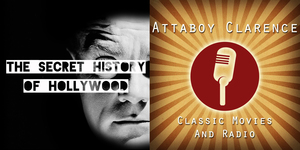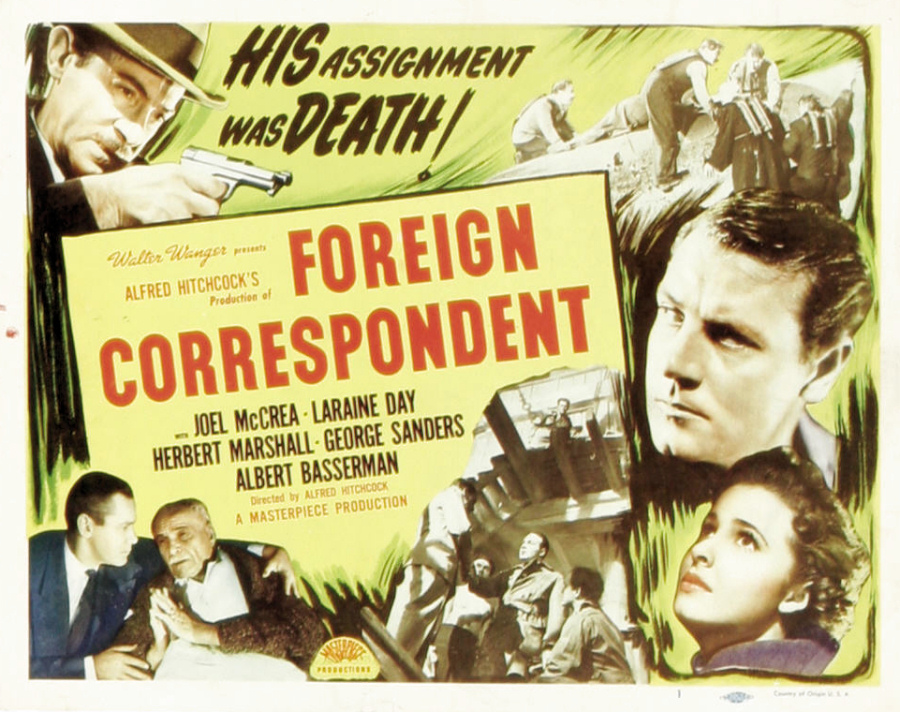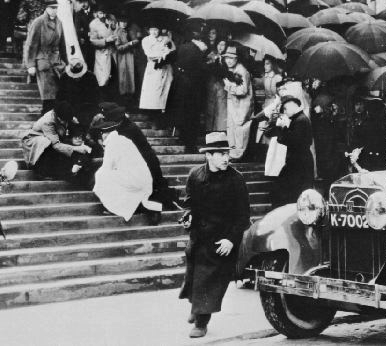Most people know that 'Rebecca' won the Academy Award for Best Picture in 1940. It was Alfred Hitchcock's first American film. He'd recently arrived in Hollywood, under contract to David O. Selznick, and with Selznick's bottomless purse at his disposal, delivered a sumptuous telling of Daphne DuMaurier's classic gothic romance. It stayed true to the book (Selznick was a stickler for sticking to the source material) and its quality confirmed Hitchcock's reputation as a major player in Hollywood.
The tension was relatively high in the room that night, February 27th, 1941, for not only were there some major films, classics that have remained so till this day, vying for the top prize, but it was the first time in the history of the Academy Awards that the winner was to be pulled from a sealed envelope. This was the night that gave birth to the immortal phrase "May I have the envelope please?".
For Hitchcock, the feeling must have been one of terror and elation, for in fact, he hadn't directed one movie that was nominated for Best Picture.
He'd directed two.
Tucked away at the bottom of the Best Picture nominees, below 'Rebecca', 'The Grapes Of Wrath', 'The Great Dictator', 'Kitty Foyle' and 'The Philadelphia Story' was 'Foreign Correspondent'.
Released just six months previously to moderate box office success, it was seen as a B-movie with good credentials, a little slice of tub-thumping propaganda, designed to thrill and educate American audiences at the same time about the peril sweeping through Europe; that distant continent beset by an evil menace. Four months after its release, the Japanese bombed Pearl Harbour, and America was finally convinced to join the fight.
But to call 'Foreign Correspondent' nothing but a call to arms is to do it a great disservice. It's also one of Hitchcock's greatest, most action-packed thrillers containing some of his best set pieces, and one of the most criminally overlooked films of all time.
Tired of receiving dull dispatches containing little to no information, Powers (Harry Davenport), the editor of the New York Globe sends tough crime reporter Johnny Jones (Joel McCrea) to Europe to grab the juice on the impending war that seems to be on its way.
Re-christened as "Huntley Haverstock" to give him an air of class, Jones's hard-bitten, no-nonsense techniques soon land him in a hotbed of spies, assassinations and double-crosses, all whilst falling in love with the daughter of peace activist (Herbert Marshall) and trying to avoid the machinations of rival reporter Scott ffolliatt (George Sanders).
While the very, very brief synopsis above may give you a general idea of the film's content, it in no way describes the sheer exhilarating thrill of this film. From its humble start to its breathless finish 120 minutes later, 'Foreign Correspondent' barely stops for breath before plunging feet first from set-piece to set-piece.
There's the light comedy of Johnny Jones, New York crime reporter, struggling with adapting to the Huntley Haverstock name and persona, complete with bowler hat. The mysterious appearance and disappearance of the invaluable Van Meer (Albert Bassermann) at a party where Jones meets the radiant Laraine Day. A breathtaking assassination in Amsterdam beneath a sea of umbrellas in the pouring rain. The puzzle of a disappearing car and a windmill that seems to be turning the wrong way. An escape across the vertiginous ledges of the Hotel Europe. A stunning sequence in which the true villain of the piece is unveiled, and hires an assassin to murder Jones, posing as his bodyguard. A fake kidnapping in the hope of exposing the villain, in an edgy, wrought two-handed scene. A rescue. A flight. An incredibly convincing plane crash at sea, and the lights being bombed out all over London as Jones's voice rings out in the dark, "Keep those lights on, America. They're the last lights left on in the world".
It could easily have been eight movies, but amazingly, this is all in one. Every scene is delightfully written, from ffolliatt's throwaway explanation of why his name has two small fs, to the moment when Carol (Day) is trying to make a speech, sifting through love notes sent by Jones in a vain attempt to steer her speech back on track, from the constant passing on of a meek Latvian dignitary, to the jaded Stebbins (Robert Benchley), Jones's "mentor" in London trying desperately to stay "on the wagon". The movie was written by committee, ten writers in all but only three getting the screen credit, among them Ben Hecht, who'd later write 'Notorious' for Hitchcock, Robert Benchley, 'Lost Horizon' and 'The Prisoner of Zenda' author James Hilton, Joan Harrison and Charles Bennett. Crucially, though, the pace, plot and storyline never feel staccato. It trips along with an organic richness, the product of constructive cohesion, not overpacked ideas jostling for space.
And what of the cast: McCrea, Day, Benchley, Sanders and Marshall backed up by some of Hollywood's finest character actors. Edmund Gwenn, Santa himself from the original 'Miracle on 34th Street', playing here against type as the evil assassin, Rowley. The wonderful Harry Davenport as Powers. Albert Bassermann's gentle Van Meer caught in a brutal, torturous game. Martin Kosleck, 'Pursuit to Algiers' knife-throwing assassin, as a sneering tramp with a little more than mud on his hands. The perennially wonderful Ian Wolfe. Eddie Conrad as the little laughing Latvian who doesn't know where to place himself. Holmes Herbert, Eduardo Ciannelli, the list goes on and on.
Yes, it does have a message that for the audience of the day was clear. We need you. Join this fight. This is the enemy, and once he's finished with us, he'll be coming for you. It's telling that even Nazi Propaganda Minister Joseph Goebbels called 'Foreign Correspondent', "A masterpiece of propaganda, a first-class production which no doubt will make a certain impression upon the broad masses of the people in enemy countries". If in some small way, the movie went on to inspire a spark of patriotic compassion in America, then at least the dressing was seasoned enough to mask the taste of agitprop.
Today, it simply stands as a masterful thriller; a B-movie with sacred credentials. It was the blueprint, along with 'The 39 Steps', for Hitchcock's 'North by Northwest' in 1959, and in my opinion it's the better film. And yet, when you ask anyone what their favourite Hitchcock movies are, it's rarely mentioned.
Watch it, and you'll see just how unfair that really is.
Luckily, Criterion feel exactly the same way as I do about the movie, and are issuing a stunning Blu-Ray of 'Foreign Correspondent' on February 18th, 2014. It includes the following:
- New 2K digital restoration, with uncompressed monaural soundtrack on the Blu-ray
- New piece on the visual effects in the film with effects expert Craig Barron
- Hollywood Propaganda and World War II, a new interview with writer Mark Harris
- Interview with director Alfred Hitchcock from a 1972 episode of The Dick Cavett Show
- Radio adaptation of the film from 1946, starring Joseph Cotten
- Have You Heard? The Story of Wartime Rumors, a 1942 Life magazine “photo-drama” by Hitchcock
- Trailer
- PLUS: A booklet featuring an essay by film scholar James Naremore
The artwork for the cover is reason enough to buy it. You can purchase it from here







